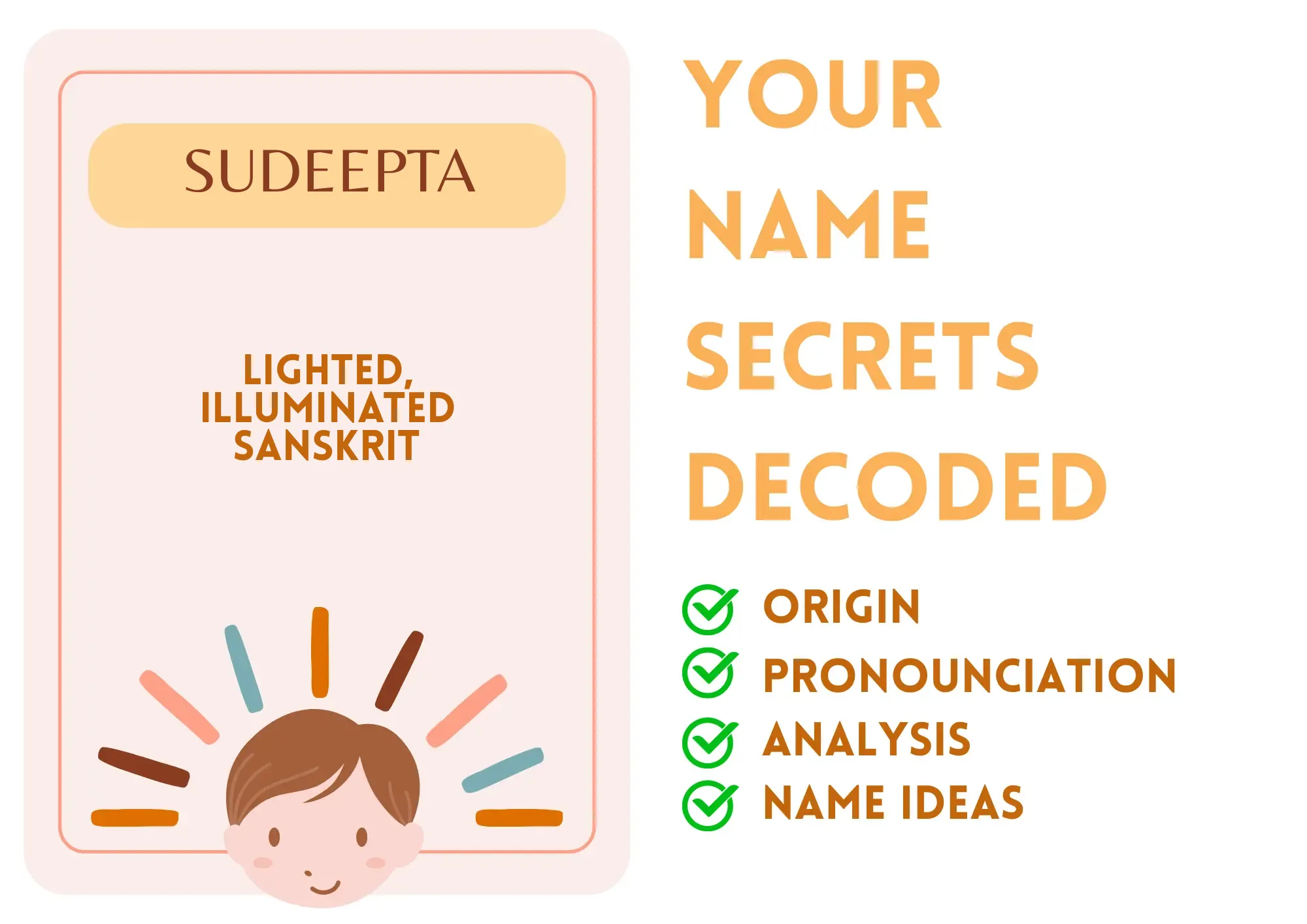
Sudeepta
Sudeepta is a beautiful and meaningful name of Sanskrit origin, translating to 'lighted' or 'illuminated.' It is predominantly used in India and among Indian communities, primarily for males but can also be unisex. The name symbolizes clarity, intelligence, and enlightenment in Hindu philosophy.
Sudeepta is perceived favorably, resonating with the ideas of brightness, knowledge, and positive energy. The name is relatively straightforward to write and pronounce, which adds to its appeal.
Although Sudeepta is not widely referenced in popular culture, its roots in Sanskrit connect it to various literary and historical traditions, symbolizing knowledge and enlightenment. It is often appreciated for its lyrical sound and rich meaning, making it a compelling choice for parents.
Basic Information
Gender: Boy
Sounds Like: Soo-DEEP-ta
Pronunciation Explanation: The emphasis is on the second syllable 'DEEP', while the first syllable is pronounced 'Soo' and the last syllable 'ta' is softer.
Summary and Meaning
Meaning: lighted, illuminated (Sanskrit)
Origin: The name Sudeepta has Indian origins, deeply connected to Hindu culture and the Sanskrit language.
Usage: Sudeepta is traditionally a masculine name but can also be used as unisex.
Name Number (Chaldean)
Name Number (Pythagorean)
Name Constellation (Nakshatra)
Name Zodiac Sign (Rashi)
Popularity (Global Rank)
Overall: 41801
Boys: 72681
Most Popular in
Religious and Cultural Significance
Religion: Hindu
Background: In Hinduism, Sudeepta carries significant meaning associated with enlightenment and the pursuit of knowledge and wisdom.
Cultural Significance: Sudeepta is favored due to its beautiful meaning and cultural heritage. It symbolizes intellect and clarity, making it an auspicious name for a child.
Historical Significance: Sudeepta, as a concept, holds historical relevance in the context of enlightenment and wisdom in Hindu philosophy, making connections to various scholarly texts and teachings.
Popular Culture
Literature and Mythology: While Sudeepta does not appear frequently in mainstream literature or mythology, its roots tie it to themes of enlightenment found in ancient texts.
Movies and Television: There may be characters with similar names across regional films who represent wisdom and knowledge, albeit not widely recognized.
Feelings and Perceptions
Perception: Sudeepta is generally viewed positively, evoking a sense of brightness, intelligence, and aspiration. It is associated with positive attributes and is respected for its cultural significance.
Positive Feelings: Intelligent, light-bringing, auspicious, unique.
Negative Feelings: Might be seen as less familiar or complex by non-Indian speakers.
Practical Considerations
Ease of Writing and Calling: Sudeepta is moderately easy to write and pronounce. Its unique sound may require some initial guidance, but once learned, it is memorable.
Common Typos and Misspellings: Sudepta,Sudepta,Sudeeptha,Sudipta
Common Nicknames: Sud,Deeps,Dee
Sudeepta Popularity
Sudeepta Usage and Popularity By Country
| Country | Rank (Overall) |
|---|---|
| Bangladesh | 8689 |
| India | 8712 |
| Oman | 12466 |
| Ireland | 23749 |
| United Arab Emirates | 26602 |
| Norway | 27537 |
| Germany | 31516 |
| Sweden | 31840 |
| New Zealand | 33723 |
| Netherlands | 70785 |
Sudeepta Usage and Popularity By City
| City | Rank (Overall) |
|---|---|
| Bengaluru | 4992 |
| Calcutta | 2662 |
| Bombay | 11523 |
| Pune | 6251 |
| New Delhi | 6608 |
| HyderÄbÄd | 14023 |
| Gurgaon | 5325 |
| Bhubaneswar | 1354 |
| Cuttack | 1213 |
| Thane | 5847 |
Compatibility Analysis
Famous Persons Named Sudeepta
No results found for Sudeepta.
Related Names
Similar Sounding Names:
Sudipta,Deepak,Seerat,Siddharth
Similar Meaning and Related Names:
Sibling Name Ideas (Brothers):
Sibling Name Ideas (Sisters):
Mira 
Hindu, Jewish
